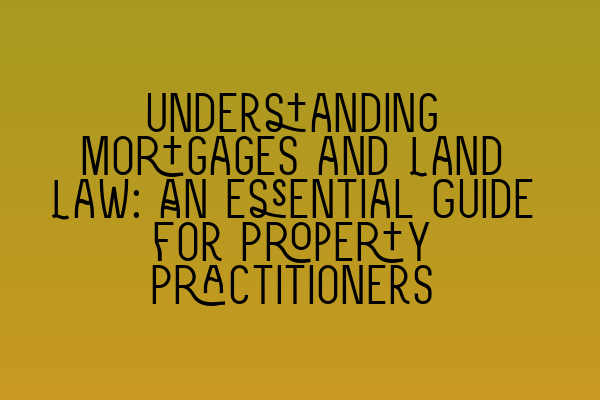Understanding Mortgages and Land Law: An Essential Guide for Property Practitioners
Welcome to the SQE Property Law & Land Law blog! As experienced solicitors in property law, we understand the intricacies and complexities of mortgages and land law. In this comprehensive guide, we aim to provide property practitioners with a clear understanding of the essential concepts related to mortgages and land law. So, let’s dive in and explore the insights!
Mortgages: The Basics
A mortgage is a legal agreement between a lender and a borrower, typically used to finance the purchase of a property. The borrower pledges the property as collateral for the loan, and the lender holds the right to sell the property if the borrower fails to repay the loan.
To fully comprehend the legal implications of mortgages, property practitioners must understand the different types of mortgages available in the market. These include fixed-rate mortgages, adjustable-rate mortgages (ARMs), interest-only mortgages, and more. Each type has its own pros and cons, and advising clients on the most suitable option requires a deep understanding of their individual circumstances.
In order to provide comprehensive advice on mortgages, property practitioners must also have a firm grasp of land law. Land law governs the ownership, acquisition, and transfer of property, and it intersects with mortgages in various ways.
Land Law: The Foundations
Land law is a vast and complex area of practice that encompasses a wide range of legal principles and regulations. It is crucial for property practitioners to have a thorough knowledge of fundamental concepts such as property rights, estates, and easements.
Property rights establish the legal ownership and control over a piece of land. Understanding the different types of property rights, including freehold and leasehold, is essential for advising clients on their rights and obligations as property owners.
Estates in land refer to the duration or extent of an individual’s property interest. This can range from a freehold estate, which grants indefinite ownership, to a leasehold estate, which grants temporary possession of a property.
Easements are another important aspect of land law. An easement is a right to use or access someone else’s land for a specific purpose. Ensuring that clients have a clear understanding of any existing easements or potential easements is crucial when dealing with property transactions and disputes.
Navigating the intricacies of land law requires a deep understanding of the legal principles at play. By staying up to date with recent changes and reforms in land law, property practitioners can provide informed and accurate advice to their clients. Our article on “Contract Law Reforms: An Analysis of Recent Changes” provides valuable insights into the evolving landscape of land law.
Contractual Capacity and Mortgages
Understanding contractual capacity is crucial when it comes to mortgage transactions. Contractual capacity refers to a person’s legal ability to enter into a contract. It is important for property practitioners to assess the capacity of both the borrower and the lender when advising clients on mortgage agreements.
Our article on “Understanding Contractual Capacity: Rights and Limitations” delves deeper into this topic, providing valuable guidance on how to assess and navigate issues related to contractual capacity in the context of mortgage transactions.
Test Your Knowledge with our SQE Contract Law Mock Tests
To further deepen your understanding of contractual capacity and other key concepts in contract law, we invite you to explore our “Interactive SQE Mock Tests for Contract Law: Test Your Knowledge.” These mock tests are designed to test your understanding and provide valuable insights into areas that may require further study or clarification.
Join Our SQE Contract Law Webinars for Expert Insights and Guidance
To stay ahead of the curve and equip yourself with the latest knowledge in contract law, we encourage you to “Join Our SQE Contract Law Webinars: Expert Insights and Guidance.” These webinars, conducted by experienced legal professionals, offer invaluable opportunities to enhance your understanding of contract law and its intersection with property law.
Parties in a Contract: Rights and Responsibilities
Understanding the rights and responsibilities of parties involved in a contract is essential for property practitioners. Our article on “Parties in a Contract: Rights and Responsibilities” goes in-depth to provide a comprehensive understanding of the legal obligations and entitlements of contract parties. This knowledge is critical when advising clients involved in mortgage transactions and navigating any potential disputes or issues.
Closing Thoughts
Mortgages and land law are intricately woven together, and property practitioners must possess a deep understanding of both areas to provide effective and comprehensive advice to their clients. By continually expanding your knowledge base, staying informed about recent changes and reforms, and regularly testing your understanding, you can ensure that you are equipped to navigate the complexities of mortgages and land law successfully.
For more insights and expert guidance on property law and land law, stay tuned to the SQE Property Law & Land Law blog. We are committed to providing valuable resources to help property practitioners excel in their craft.
